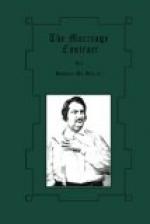CHAPTER IV
THE MARRIAGE CONTRACT—SECOND DAY
The next day Elie Magus (who happened at that time to be in Bordeaux) obeyed Madame Evangelista’s summons, believing, from general rumor as to the marriage of Comte Paul with Mademoiselle Natalie, that it concerned a purchase of jewels for the bride. The Jew was, therefore, astonished when he learned that, on the contrary, he was sent for to estimate the value of the mother-in-law’s property. The instinct of his race, as well as certain insidious questions, made him aware that the value of the diamonds was included in the marriage-contract. The stones were not to be sold, and yet he was to estimate them as if some private person were buying them from a dealer. Jewellers alone know how to distinguish between the diamonds of Asia and those of Brazil. The stones of Golconda and Visapur are known by a whiteness and glittering brilliancy which others have not,—the water of the Brazilian diamonds having a yellow tinge which reduces their selling value. Madame Evangelista’s necklace and ear-rings, being composed entirely of Asiatic diamonds, were valued by Elie Magus at two hundred and fifty thousand francs. As for the “Discreto,” he pronounced it one of the finest diamonds in the possession of private persons; it was known to the trade and valued at one hundred thousand francs. On hearing this estimate, which proved to her the lavishness of her husband, Madame Evangelista asked the old Jew whether she should be able to obtain that money immediately.
“Madame,” replied the Jew, “if you wish to sell I can give you only seventy-five thousand for the brilliant, and one hundred and sixty thousand for the necklace and earrings.”
“Why such reduction?”
“Madame,” replied Magus, “the finer the diamond, the longer we keep it unsold. The rarity of such investments is one reason for the high value set upon precious stones. As the merchant cannot lose the interest of his money, this additional sum, joined to the rise and fall to which such merchandise is subject, explains the difference between the price of purchase and the price of sale. By owning these diamonds you have lost the interest on three hundred thousand francs for twenty years. If you wear your jewels ten times a year, it costs you three thousand francs each evening to put them on. How many beautiful gowns you could buy with that sum. Those who own diamonds are, therefore, very foolish; but, luckily for us, women are never willing to understand the calculation.”
“I thank you for explaining it to me, and I shall profit by it.”
“Do you wish to sell?” asked Magus, eagerly.
“What are the other jewels worth?”
The Jew examined the gold of the settings, held the pearls to the light, scrutinized the rubies, the diadems, clasps, bracelets, and chains, and said, in a mumbling tone:—
“A good many Portuguese diamonds from Brazil are among them. They are not worth more than a hundred thousand to me. But,” he added, “a dealer would sell them to a customer for one hundred and fifty thousand, at least.”




